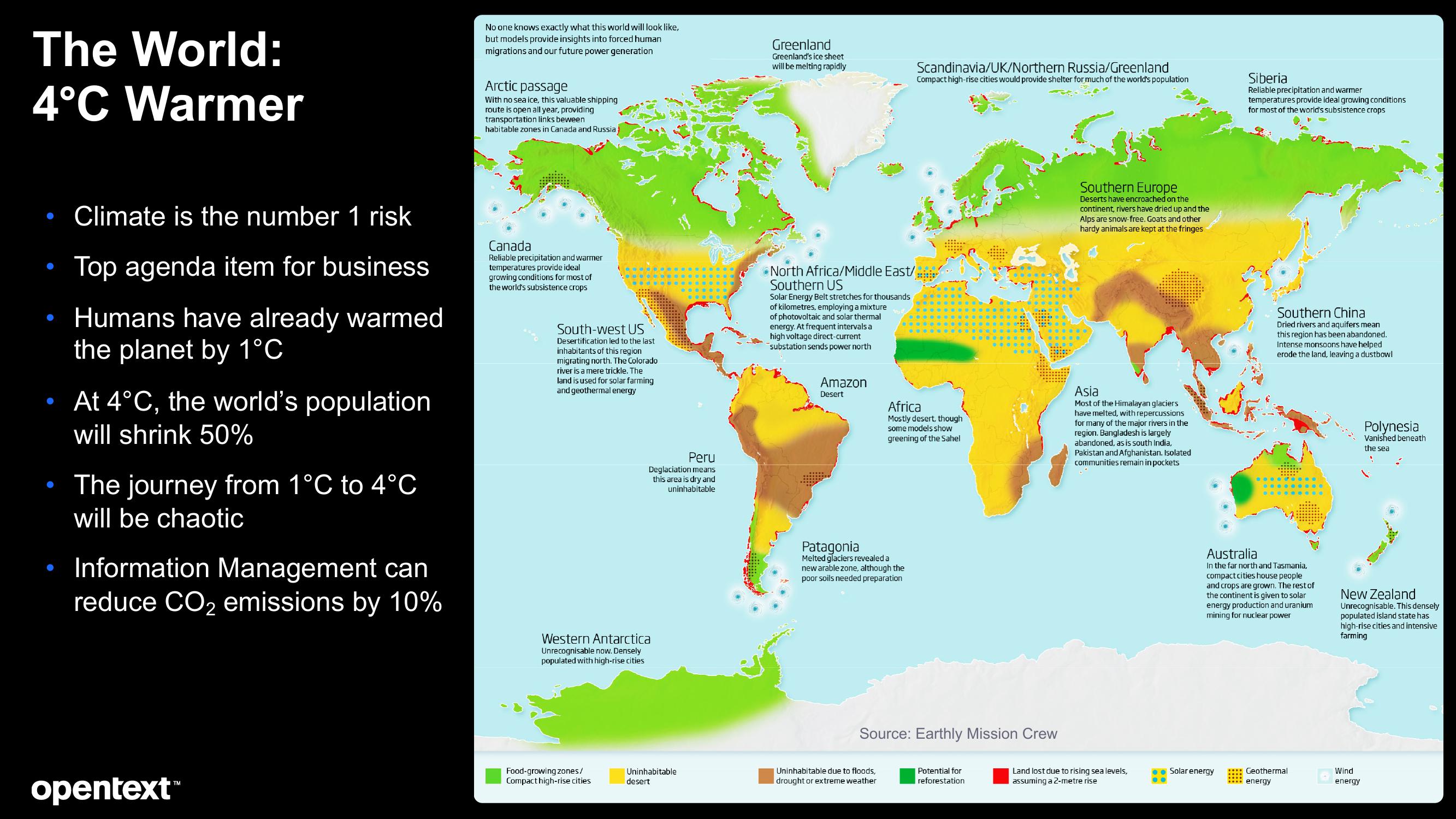OpenText Investor Presentation Deck
The World:
4°C Warmer
●
Climate is the number 1 risk
Top agenda item for business
Humans have already warmed
the planet by 1°C
At 4°C, the world's population
will shrink 50%
The journey from 1°C to 4°C
will be chaotic
Information Management can
reduce CO₂ emissions by 10%
opentext™
No one knows exactly what this world will look like,
but models provide insights into forced human
migrations and our future power generation
Arctic passage
With no sea ice, this valuable shipping
route is open all year, providing
transportation links beween
habitable zones in Canada and Russia
Canada
Reliable precipitation and warmer
temperatures provide ideal
growing conditions for most of
the world's subsistence crops
South-west US
Desertification led to the last
inhabitants of this region
migrating north. The Colorado
river is a mere trickle. The
land is used for solar farming
and geothermal energy
Peru
Deglaciation means
this area is dry and
uninhabitable
Western Antarctica
Unrecognisable now. Densely
populated with high-rise cities
Food-growing zones/
Compact high-rise cities
Uninhabitable
desert
Greenland
Greenland's ice sheet
will be melting rapidly
North Africa/Middle East/
Southern US
Solar Energy Belt stretches for thousands
of kilometres, employing a mixture
of photovoltaic and solar thermal
energy. At frequent intervals a
high voltage direct-current
substation sends power north
Amazon
Desert
Patagonia
Melted glaciers revealed a
new arable zone, although the
poor soils needed preparation
Scandinavia/UK/Northern Russia/Greenland
Compact high-rise cities would provide shelter for much of the world's population
Uninhabitable due to floods,
drought or extreme weather
⠀⠀⠀⠀⠀
S
Africa
Mostly desert, though
some models show
greening of the Sahel
Source: Earthly Mission Crew
Potential for
reforestation
Southern Europe
Deserts have encroached on the
continent, rivers have dried up and the
Alps are snow-free. Goats and other
hardy animals are kept at the fringes
Asia
Most of the Himalayan glaciers
have melted, with repercussions
for many of the major rivers in the
region. Bangladesh is largely
abandoned, as is south India,
Pakistan and Afghanistan. Isolated
communities remain in pockets
Land lost due to rising sea levels,
assuming a 2-metre rise
Siberia
Reliable precipitation and warmer
temperatures provide ideal growing conditions
for most of the world's subsistence crops
● Solar energy
Southern China
Dried rivers and aquifers mean
this region has been abandoned.
Intense monsoons have helped
erode the land, leaving a dustbowl
Australia
In the far north and Tasmania,
compact cities house people
and crops are grown. The rest of
the continent is given to solar
energy production and uranium
mining for nuclear power
:::: Geothermal
energy
Polynesia
Vanished beneath
the sea
•
New Zealand
Unrecognisable. This densely
populated island state has
high-rise cities and intensive
farming
Wind
energyView entire presentation